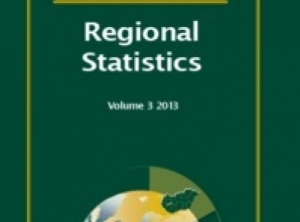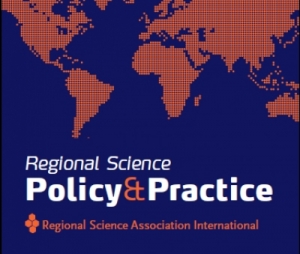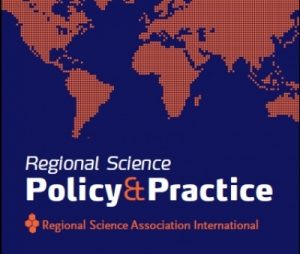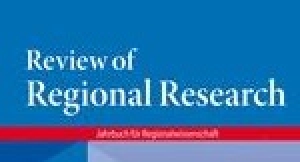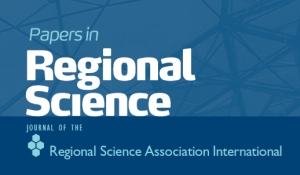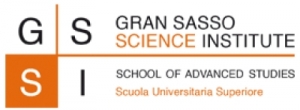Jobs
Elisabete Martins
New issue (number 46 - Special issue on "Linkages and channels between Cohesion Policy and European Identity”) of Investigaciones Regionales - Journal of Regional Research
Volume 46 of Investigaciones Regionales-Journal or Regional Research is published under the form of a Special Issue devoted to the analysis of “Linkages and channels between Cohesion Policy and European Identity”. The volume has been coordinated by Professors Jordi Suriñach (Universitat de Barcelona) and Edoardo Mollona (Università di Bologna) and is associated with the results of the European H2020 project named PERCEIVE, being six papers related to this project, while a seventh work, the one signed by Giovanni Perucca, is associated to another EU-funded project – COHESIFY, with similar objectives and perspectives.
This issue consists of an editorial and seven other research articles. In the Editorial, the coordinators of the volume describe the search of a main better understanding of the channels through which European policies contribute to create both different local understandings of the EU and different levels of European identification across profoundly different European regions. The papers presented in this special issue display the multidisciplinary portfolio of competences and analytical methods to elicit the meaning structures in public discourse about the EU. The papers mobilize two theoretical perspectives: a rational choice and a social constructivist perspective. The former puts forward an idea of institutions as “rules of the game” and that emphasizes the calculative rationality of actors as determinants of European identities and identification, while the second stresses the idea that European identities and identification emerge from a process of “social learning” associated with different institutional discourses.
The first paper opens the special issue and report empirical research to describe the general features of the phenomena under investigation. In the paper Do Citizens Support Cohesion Policy? Measuring European support for redistribution within the EU and its correlates, Nicholas Charron presents the results of a survey that investigates how citizens feel about economic integration within the Union and what attitudes they have towards cohesion policy. Grounding on 17,200 interviews to European citizens, the survey shows the variation in citizens’ support for EU Cohesion policy between countries and describes how support varies between demographic groups. To speculate on the relative exploratory power of rational versus cultural approaches, the survey studies as well as the extent to which utilitarian and ideational factors underpin support.
The paper written by Rosina Moreno, EU Cohesion Policy Performance: Regional Variation in the Effectiveness of the management of the Structural Funds, investigates the dynamics of absorption of EU cohesion funds at NUTS2 level. The effectiveness in the absorption of funds is a crucial challenge for EU member states and this article takes an original perspective by focusing on the regional variation in the absorption of the structural funds. A dimension, this latter, that has been overlooked in previous literature. The paper suggests that full absorption is more the exception than the rule and high regional heterogeneity in the absorption of the Structural Funds is not only observed across countries but also within the regions in a country.
A review of the theoretical arguments that explain the process of creation of a European identity is provided in the article written by Vicente Royuela and Enrique López-Bazo, Understanding the process of creation of European identity – the role of Cohesion Policy. In the article, the authors discuss the grounds of mechanisms and determinants driving citizens’ identification with Europe, stressing the role of the territorial dimension on European identity formation. The authors analyse the main theoretical arguments on the construction of European identity. They also analyse the role of Cohesion Policy by confronting the concepts of spatial identities with a historical perspective of the European project. Finally, they inspects the role of European institutions by providing some basic figures on the regional expenditure on Structural Funds and its association with the awareness, support and identification with the EU project
In their paper, Profiling identification with Europe and the EU project in the European regions Cristina Brasili, Pinuccia Calia and Irene Monasterolo investigate to what extent do EU citizens identify with Europe and the EU project, whether European regions have different patterns and level of identification and what, if any, is the role of socio-economic variables. The authors develop a novel probabilistic classification model, IdentEU, and use micro-level data from a survey implemented within the PERCEIVE project. The reported empirical research reveals that trust in the EU institutions, the effectiveness of EU Cohesion Policy and spending, and the level of corruption are three relevant drivers of citizens’ identification with the European project.
To conclude the group of papers addressing the formation of EU identity, the paper by Giovanni Perucca. When Country Matters More than Europe: What Implications for the Future of the EU? studies the determinants of the imbalance between the identification of a citizen’s with her/his country, on the one hand, and with Europe on the other. The work reported in the paper moves off from noting how recent empirical evidence shows an increasing imbalance in favor of the identification with individuals’ country of residence. This phenomenon, the author suggests, may be connected with the increasing support to nationalisms and Eurosceptic parties almost everywhere in the EU. The results presented, based on a panel data model using data from five Eurobarometer survey studies conducted between 2014 and 2017, suggest that individuals with lower education and income, and those living in the lagging-behind regions of the EU, are more likely to identify more with their own country than with Europe. Thus, the paper supports the hypothesis that unequal distribution (among individuals and regions) of the benefits from EU integration is a determinant worth considering of the emerging antagonism between European and national identity.
A second thread of investigation reported in this special issue addresses whether and how the communication strategies of Cohesion policy affect the perception of the policy and the identification with the EU.
In their paper, Luca Pareschi, Edoardo Mollona, Vitaliano Barberio and Ines Kuric (The use of social media in EU policy communication and implications for the emergence of a European public sphere) analyze cohesion policy communication on social media of ten Local Managing Authorities (LMAs) that manage structural funds at the local level and communicate to stakeholders information concerning Cohesion Policy. The authors use semi-automatic text analysis techniques to elicit shared meaning structures as they emerge in the discussion on social media. The aim is to understand whether an European public-sphere exists in which a shared EU identity can emerge. The reported results show the emergence of an internationally articulated cluster of topics that showcase a negative attitude towards the EU funding scheme and a generally skeptic attitude towards the Europe Union. This fact suggests that, counter-intuitively, Euroscepticism seems to facilitate, and be inflated, the emergence of a European public sphere.
The paper by Giovanni Cunico, Eirini Aivazidou and Edoardo Mollona (European Cohesion Policy performance and citizens’ awareness: A holistic System Dynamics framework) integrates the analysis of implementation and communication. Namely, based on the interviews to policy-makers, stakeholders and beneficiaries of cohesion policy, the paper develops a holistic qualitative framework that elicits the causal structure underpinning the distribution of the Cohesion Policy funds, the impact on projects’ quality of the management capability at local managing authority level, and the related, communication processes. The authors developed the qualitative causal model with the aim at stimulating a focused discussion on Cohesion Policy. The motivation behind this modelling effort is to provide policy-makers, stakeholders and scholars interested in Cohesion Policy analysis with a conceptual tool able to elicit the interconnections among the key processes at work and, more specifically, between the dynamics of funds absorption, policy communication and the mechanisms that produce awareness about the policy.
This issue has been sponsored by the Directorate General of Community Funds and co-financed by the ERDF (European Regional Development Fund).
Isabelle Thomas
MAPS AND ATLASES always fascinated me as a child, even if I would have loved (and still do!) to be an English/Dutch schoolteacher! I chose geography instead of philology because I perceived very early that geography was a science at the crossroad of many other disciplines, not too specialized but challenging enough and dealing with societal and environmental issues … and foreign languages could also be useful! I now think that I took the right decision!
From the very beginning of my research career, I was oriented to quantitative analyses and modelling by my promoter/supervisor Hubert Beguin. He almost forced me to do a PhD and decided for me that it would deal with optimal locations, using operational research models and applying them to real-world situations (in my case post-offices). This was quite novel at that time.
After a fruitful Post-doc period, there was unfortunately no academic positions available that were compatible with my family constraints so I left the university for a quite unusual and challenging position: scientific collaborator at the Gendarmerie Headquarters (Brussels). We were a team of two geographers hired as civilians to work in a military environment, two women in a work environment where officers were still men only: an adventure! Our mission: to provide support with geostatistical tools, maps and models. I was in charge of road accidents, my colleague of criminality. Where do accidents occur? Why there? What is the best location of police patrols? What is the optimal partitioning for police districts? This was a period where I learned how to use geospatial techniques or models, and present their results in layman’s terms, showing the usefulness of geography in operational decision making. I think most academics would gain from working for a while out of the academic world: such an experience helps enormously in teaching or in writing multidisciplinary research projects.
After this unconventional experience, I came back to university with a FNRS permanent research position at the Department of Geography in Louvain-la- Neuve (Be) where I mainly conducted research in economic and transport geography, and additionally taught several courses such as statistical cartography, transport or economic geography and gave tutorials on thesis preparation. I also wrote a second doctoral dissertation on the sensitivity of location-allocation models to transportation issues. I later moved to the Center of Operations Research and Econometrics (CORE), an internationally well-known scientific research centre, where I was the only geographer among mainly economists, operational researchers and engineers.
Now more than ever I feel rich and stronger for those multidisciplinary research experiences. I’ve particularly appreciated to work at the border of my discipline. I’ve engaged with very nice and openminded researchers with whom I have exchanged ideas and published. Not only geographers of other universities/ countries, but also economists, physicists, engineers, epidemiologists and medical doctors. Constructing a scientific project or publishing together is for sure not an easy task: we think differently, we’ve other priorities, we refer to other models/theories, and even write our scientific papers differently. But what satisfaction when we succeed in respecting each other, taking advantage of our complementarities, constructing new ideas and realizing in fact that we deal with the same questions but with different words, tools or theories.
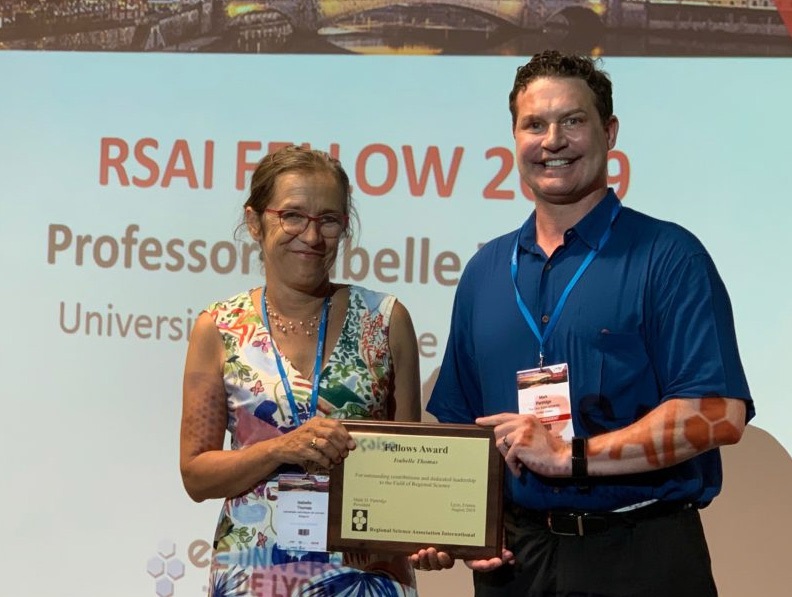 Quantitative geography has a great future especially in regional sciences. Geography has always dealt with locations, large data sets or nested scales and has accumulated knowledge, even if geographers are often shy in putting this forward. Geography is hence now more than ever ready to deal with topics such as complexities or “big data”. Small or big, new data types appear every day: sensors become censors in the new smart environments. Geographers know better than any other researcher that spatial data are special… Big data do not change fundamentally the problems; there is no need to reinvent the wheel: aggregation biases, close things are more related than distant things, statistical biases, etc. It seems that nowadays I too frequently read papers that simply let the data speak by themselves, without any caution. I hope to have time in the coming years to further work on these topics, to fight with geographical tools against data bulimia and theory anorexia, to help machine learning researchers in further constructing meaningful models that do not reinvent geography but push forward their results into further models and theories.
Quantitative geography has a great future especially in regional sciences. Geography has always dealt with locations, large data sets or nested scales and has accumulated knowledge, even if geographers are often shy in putting this forward. Geography is hence now more than ever ready to deal with topics such as complexities or “big data”. Small or big, new data types appear every day: sensors become censors in the new smart environments. Geographers know better than any other researcher that spatial data are special… Big data do not change fundamentally the problems; there is no need to reinvent the wheel: aggregation biases, close things are more related than distant things, statistical biases, etc. It seems that nowadays I too frequently read papers that simply let the data speak by themselves, without any caution. I hope to have time in the coming years to further work on these topics, to fight with geographical tools against data bulimia and theory anorexia, to help machine learning researchers in further constructing meaningful models that do not reinvent geography but push forward their results into further models and theories.
I’m so happy and proud as a geographer to be awarded the RSAI Fellowship. I never aimed for it, but it happened in 2019 (pictured on the left, with prof. Partridge). I’m simply enjoying the moment!
Isabelle Thomas
Research Director at the National Fund for Scientific Research (FRS-FNRS) Extraordinary Professor, Université catholique de Louvain, Louvain-la-Neuve (Belgium)
(Published on RSAI Newsletter 2020 May)
JOB POSITION | Post-doctoral position in economics “Performance of water supply services and multi-objective asset management: contribution of the cost-benefit analysis”
Please find enclosed (below) a call for application for a 15-month postdoctoral position in economics entitled “Performance of water supply services and multi-objective asset management: contribution of the cost-benefit analysis” offered by INRAE, the French National Research Institute for Agriculture, Food and the Environment, ETBX research unit.
The position is based in Cestas, France. The expected starting period is September 1, 2020.
Deadline for application: 19th July 2020.
The New Issue of Regional Statistics is already Available! (2020, VOL 10, No 1.)
THE NEW ISSUE OF REGIONAL STATISTICS IS ALREADY AVAILABLE!
We are pleased to inform you that a new issue of the Regional Statistics has been released and now it’s avaiable online.
http://www.ksh.hu/docs/hun/xftp/terstat/2020/eterstat2001.pdf
REGIONAL STATISTICS, 2020, VOL 10, No 1.
STUDIES
Trianon memorial issue
Zoltán Hajdú: Structural and administrative implications of the Trianon Peace Treaty, 1920
http://www.ksh.hu/docs/hun/xftp/terstat/2020/rs100103.pdf
Gábor Demeter: Estimating regional inequalities in the Carpathian Basin – Historical origins and recent outcomes (1880–2010)
http://www.ksh.hu/docs/hun/xftp/terstat/2020/rs100105.pdf
János Pénzes: The impact of the Trianon Peace Treaty on the border zones – an attempt to analyse the historic territorial
development pattern and its changes in Hungary
http://www.ksh.hu/docs/hun/xftp/terstat/2020/rs100102.pdf
Béla Tomka: The economic consequences of World War I and the Treaty of Trianon for Hungary
http://www.ksh.hu/docs/hun/xftp/terstat/2020/rs100101.pdf
Ferenc Szilágyi– Tibor Elekes: Changes in administration, spatial structure, and demography in the Partium region since
the Treaty of Trianon
http://www.ksh.hu/docs/hun/xftp/terstat/2020/rs100104.pdf
Tibor Elekes– Ferenc Szilágyi: Administrative, spatial and demographic changes in Székelyland since the Treaty of Trianon to the present day
http://www.ksh.hu/docs/hun/xftp/terstat/2020/rs100107.pdf
Sándor Kókai.: How the Trianon Peace Treaty impeded social and spatial structure progress in the Bánság (1918–2010)
http://www.ksh.hu/docs/hun/xftp/terstat/2020/rs100108.pdf
VISUALIZATIONS
András Bereznay: Trianon: self-defeating self-determination
http://www.ksh.hu/docs/hun/xftp/terstat/2020/rs100106.pdf
Join us to our social networking sites:
RSPP Call for Papers | Special Issue on Modelling place attractiveness in the era of Big and Open data (New Deadline)
RSPP Call for Papers
Special Issue on Modelling place attractiveness in the era of Big and Open data
From hedonic house price models on micro-scales to estimations of regional economic resilience on the macro-level, an understanding of the spatial distribution of amenities and the local composition of neighbours and jobs is of key importance. Some of the amenities or attributes that are commonly used in house price modelling, such as quality of housing, job- accessibility as well as proximity to railway stations or nature are relatively easy to measure and integrate in an empirical modelling framework. Factors relating to perceptions about neighbourhood characteristics, status or even architecture may be far more difficult to account for in a satisfactory way. Moreover neighbourhood characteristics, amenities and prices are partly linked by circular causation.
In recent years, an increasing amount of spatio-temporal data have been made publically and openly available for research, particularly in online map-databases and through API: s. This development enables researchers to connect weather, transport schedules, and detailed geocoded databases listing a wide range of amenities to data on urban form, street-networks and housing. The new data sources enable us to reformulate the way we measure and use amenities in econometric models.
In this call we invite presentations that problematize and develop methods and theories that can be used to better understand and define amenities in studies of housing markets or place attractiveness.
We specifically invite papers that address questions relating to:
- Combining hedonic price house price models and spatial analysis
- The study of temporal variations, including yearly, seasonal and diurnal patterns, of availability and attraction of amenities
- Theory and methods for the measure of accessibility to green and blue resources using spatial analysis and GIS
- Enriching models on mezzo- and macro-scales using disaggregate spatial and temporal data for the creation of variables.
- The use of international resources and classifications of data that could be integrated in comparative modelling.
- Usage of data from demographic and socio-economic micro-data registers, and the creation of bespoke neighbour statistics.
- Usage of Big data, smart data and qualitative methods
- Integrating mobility and the ambient population in measures of place attractiveness
- Architecture, space syntax, and urban form – what are the connections between the spatial form of the urban landscape and place attraction?
- The modelling of causal impacts rather than correlations, as well as of endogenous amenities
- Modelling approaches focusing on location choice and selection processes in view of idiosyncratic amenities.
Interested scholars are encouraged to submit an article in the platform of Regional Science Policy and Practice (https://rsaiconnect.onlinelibrary.wiley.com/journal/17577802) until September 12, 2020. The papers will be on-line after accepted by a blind peer review process. The accepted paper will be compiled in a special issue.
Editors: John Östh (This email address is being protected from spambots. You need JavaScript enabled to view it.), Umut Türk and Jie Huang
RSPP Call for Papers on Understanding the Spatial Dynamics of Social Unrest
RSPP Call for Papers on
Understanding the Spatial Dynamics of Social Unrest
According to Albert Hirschman (1970) when people or places perceive decreases in their quality of life they can respond in a number of ways. Individuals can take no action, stay and advocate for change, or exit and move to another place (Hoffmann, 2008). The exit of people, although worthy of ongoing study, has received profound treatment in migration studies. The exit of places through secession has been an interesting topic for regional science (McCann, 2018; Suriñach and Dentinho, 2019). The voice of populist or discontent voters has gained traction and is getting increased attention (Van-Leeuwen & Halleck-Vega, 2020).
There is a regional science literature on Social Unrest. Glaeser and Di Pasquali (1998), on the Los Angeles Social Unrest of 1992, used different explanatory variables, finding ethnic diversity, but not poverty, to be important. Collins and Margo (2007) analysed the negative consequences of Social Unrest on real estate values, demonstrating that it is better to take no action than to be protester. While protests may start in a particular place, they can quickly diffuse to other parts of a city or country, or even internationally.
To better comprehend protests it is important to get an improved understanding of the perceived spatial and social dysfunctions that ignite and fuel them, and result in them occurring in particular places at particular moments in time. Recently, we have witnessed protests in Baghdad, Paris, Barcelona, Hong Kong, Quito, Caracas, and the United States. In recent years, it seems that protests have not only become more frequent but damages they inflict have become much more considerable (Yeo, 2019).
The aim of this Call for Papers is to understand the spatial conditions that ignite protests and the spatial impacts of these events.
Interested scholars are encouraged to submit an article in the platform of Regional Science Policy and Practice (https://rsaiconnect.onlinelibrary.wiley.com/journal/17577802) until November 22, 2020. The papers will be on-line after accepted by a blind peer review process.
The RSPP Editorial Team
Call for Papers: “The potential of small-scale spatial data’’ Special Issue of the Review of Regional Research
Call for Papers: “The potential of small-scale spatial data’’
Special Issue of the Review of Regional Research
Guest editors: Rolf Bergs (PRAC Bergs & Issa Partnership Co.) and Rüdiger Budde (RWI-Leibniz-Institute for Economic Research)
A major constraint in spatial analysis has been the information deficit at small-scale spatial level. The use of official area-wide regional data, as provided by Destatis, Eurostat or others, is hampered by the fact that these data, being resolved at NUTS 2 or NUTS 3 level, are too coarse to allow sufficiently precise estimates of certain relationships and impacts or a truly functional classification of space. This has often hampered policy to conclude with targeted interventions into the economy, social affairs, the labour market or the environment.
Since around 2010 the improved provision of small-scale data at neighbourhood level, grid data at one square kilometre resolution or satellite data at a resolution of few hectares has opened doors to stronger empirical precision. Meanwhile, many EU countries grant free access to grid data on population density. In some Nordic countries, further differentiated datasets at grid or small-scale level are available. In Germany, commercial data sets with certain socio-economic contents now supplement official statistics. In addition, there is ubiquitous free access to various sorts of satellite imagery such as e.g. VIIRS (14-bit night satellite images with rich socio-economic and environmental information). Those data processed with novel sophisticated spatial analysis methods, such as supervised or unsupervised spatial clustering or advanced spatial econometrics may largely contribute to evidence-based policy in various fields.
This special issue is intended to contribute to the required knowledge base and to provide new evidence on the advantages of small-scale spatial or grid data. Potential topics include (but are not limited to):
• Generation of small-scale neighbourhood and grid data
• Relevant statistical and econometric methods
• Functional segmentation of space
• Spatial heterogeneity and dependence
• Spatial interaction (e.g. rural-urban)
• Cross-sectional neighbourhood effects (education, health, labour market, investment, environment, living, wealth)
• Policy impact estimated with small-scale spatial data
• Epidemiological research of space
Submission via Editorial Manager opens 1 November 2020 and closes 31 March 2021
Expected publication: August 2022
Literature
Dubé, J, Legros, D (2014) Spatial Econometrics using Microdata, London and Hoboken: Iste and Wiley
Fernández-Vázquez E, Rubiera Morillon F (2012) Defining the Spatial Scale in Modern Regional Analysis: New Challenges from Data at Local Level. Berlin, Heidelberg: Springer
van Ham M (2012) Neighbourhood Effects Research: New Perspectives. Dordrecht: Springer
Zhang J, Atkinson PM, Goodchild MF (2014) Scale in Spatial Information and Analysis, Boca Raton: CRC Press
The latest issue of Papers in Regional Science is available! Volume 99, 3 (June 2020)
|
Papers in Regional Science Pages: 403-854 June 2020 |
ISSUE INFORMATION
Pages: 403-404 | First Published: 28 May 2020
FULL ARTICLES
Relatedness in the implementation of Smart Specialisation Strategy: a first empirical assessment
Diego D'Adda, Donato Iacobucci, Roberto Palloni
Pages: 405-425 | First Published: 16 November 2019
The impact of uncertainty on production relocation: Implications from a regional perspective
Jesús F. Lampón
Pages: 427-446 | First Published: 13 November 2019
Luis Ayala, Javier Martín‐Román, Juan Vicente
Pages: 447-477 | First Published: 12 December 2019
Alfonso Díez‐Minguela, Rafael González‐Val, Julio Martinez‐Galarraga, M. Teresa Sanchis, Daniel A. Tirado
Pages: 479-508 | First Published: 14 November 2019
![]() Open Access
Open Access
Regional income and wave energy deployment in Ireland
Niall Farrell, Cathal O'Donoghue, Karyn Morrissey
Pages: 509-531 | First Published: 05 November 2019
Enrique J. Buch‐Gómez, Roberto Cabaleiro‐Casal
Pages: 533-553 | First Published: 05 November 2019
Well‐being in European regions: Does government quality matter?
Jesús Peiró‐Palomino, Andrés J. Picazo‐Tadeo, Vicente Rios
Pages: 555-582 | First Published: 29 November 2019
Viktor Kvĕtoň, Aleš Bĕlohradský, Jiří Blažek
Pages: 583-602 | First Published: 17 January 2020
Winners and losers of rapid growth in Turkey: Analysis of the spatial variability of convergence
Burhan Can Karahasan
Pages: 603-644 | First Published: 12 December 2019
Are eco‐labels good for the local economy?
Cristina Bernini, Augusto Cerqua
Pages: 645-661 | First Published: 17 December 2019
Measuring spatial concentration: A transportation problem approach
Mauro Ferrante, Giovanni Luca Lo Magno, Stefano De Cantis, Geoffrey J.D. Hewings
Pages: 663-682 | First Published: 23 October 2019
Silvia Vignetti, Francesco Giffoni, Chiara Pancotti, Francesca Pagliara
Pages: 683-703 | First Published: 12 December 2019
Has highway construction narrowed the urban–rural income gap? Evidence from Chinese cities
Zhenxiong Huang, Hangtian Xu, Jianming Li, Nengsheng Luo
Pages: 705-723 | First Published: 04 January 2020
Augusta Pelinski Raiher
Pages: 725-747 | First Published: 06 November 2019
Segregation and urban spatial structure in Barcelona
Miquel‐Àngel Garcia–Lopez, Rosella Nicolini, José Luis Roig
Pages: 749-772 | First Published: 21 October 2019
The impact of immigration on housing prices in Australia
Morteza Moallemi, Daniel Melser
Pages: 773-786 | First Published: 22 December 2019
Labour market effects of urban riots: An experimental assessment
Emmanuel Duguet, David Gray, Yannick L'Horty, Loïc du Parquet, Pascale Petit
Pages: 787-806 | First Published: 21 October 2019
Local financialization, household debt, and the great recession
Luke Petach
Pages: 807-839 | First Published: 13 January 2020
![]() Open Access
Open Access
The evolution of Zipf's Law for U.S. cities
Angelina Hackmann, Torben Klarl
Pages: 841-852 | First Published: 12 December 2019
Call for Papers: 27th APDR Congress, 10-11 September 2020, Angra do Heroísmo in Terceira Island, Portugal (participation in place or on webinar)
UPDATE: APDR CONGRESS POSTPONED TO 10-11 SEPTEMBER 2020 (participation in place or on webinar).
Considering the evolving nature of the COVID-19 (coronavirus) outbreak, APDR has chosen to proactively postpone the APDR 2020 Annual Conference. The conference, previously scheduled for July 9-10, will now be held September 10-11, 2020.
Call for Papers
The APDR invite regional scientists, economists, economic geographers, urban planners, policy makers, and researchers of related disciplines to participate in the 27th APDR Congress that will be held from 10 to 11 of September, 2020, at the Centro Cultural e de Congressos de Angra do Heroísmo (CCCAH) in Terceira Island, Portugal. The participation can be in place or on webinar.
Beyond the various themes related to regional science this congress will focus on the emerging topic of Sustainable Management of the Sea for Sustainable Regional Development. With the enlargement of the ocean areas managed by countries it is important to know what are the aims? What the management tools are? And what the impacts are for human communities?
The call for papers are open and your participation is very welcome!
Special Sessions:
SS01 - Demografia e Economia dos Açores
SS02 - Creative tourism and local/regional development
SS03 - Transport Infrastructure, Accessibility and Regional Development
SS04 - The spatial management in the cultural landscape of Pico Island
SS05 - Variability and Change on Hydro-Meteorological Extremes and Hazards
SS07 - Driving forces of Urban Transformation: data, models and tools
SS09 - Bioremediation as a solution for regional environmental issues
SS10 - Regional Drivers Effects and Policies of Coronavirus
Regular Sessions:
RS01 - Sustainable Management of the Sea for Sustainable Regional Development
RS02 - New Urban Agenda and Sustainable Development Goals
RS03 - Circular Economy at Regional, National and International Level
RS04 - Migration, Integration, Growth and Welfare
RS05 - Social, Economic and Environmental spatialized impacts of tourism and sports
RS06 - Spatial Aspects of the Green Deal
RS07 - Climate change mitigation and adaptation
RS08 - Spatial Allocation of Public Goods and Services
RS09 - Regional resilience and crisis
RS10 - Low-density regions and development
RS11 - Big and Available Data for regional science
RS12 - Geographic Information Systems and location modelling
RS13 - Systemic Analysis of Transport and Communication Networks
RS14 - Methodological approaches to Innovation and Entrepreneurship
RS15 - Operational Models for Cities and Regions
RS16 - Qualitative analysis of spatial interaction within space
RS17 - Spatial econometrics
RS18 - Ecological Economic Approaches and Methods
RS19 - Tools to analyse, evaluate and Manage Ecosystem Services
RS20 - Urban design and city competitiveness and sustainability
Deadline for Abstracts submissions: June 26, 2020. Authors should submit their abstracts through online submission system by following the link https://cmt3.research.microsoft.com/APDR2020.
All information at the congress website: http://www.apdr.pt/congresso/2020
Looking forward to meeting you in Angra do Heroísmo!
The Organizing Committee and the Board of APDR
27th APDR Congress
GRAN SASSO SCIENCE INSTITUTE PHD PROGRAMS – CALL FOR APPLICATIONS 2020
The PhD call is available at the following web-site (along with the other GSSI PhD programs): https://applications.gssi.it/phd/docs/2020/Call%20PhD%20XXXVI.pdf (Deadline: June, 11th, 2020).
A presentation of the program is available at the following web-site: https://www.gssi.it/education/regional-science-economic-geography
About Us
The Regional Science Association International (RSAI), founded in 1954, is an international community of scholars interested in the regional impacts of national or global processes of economic and social change.



